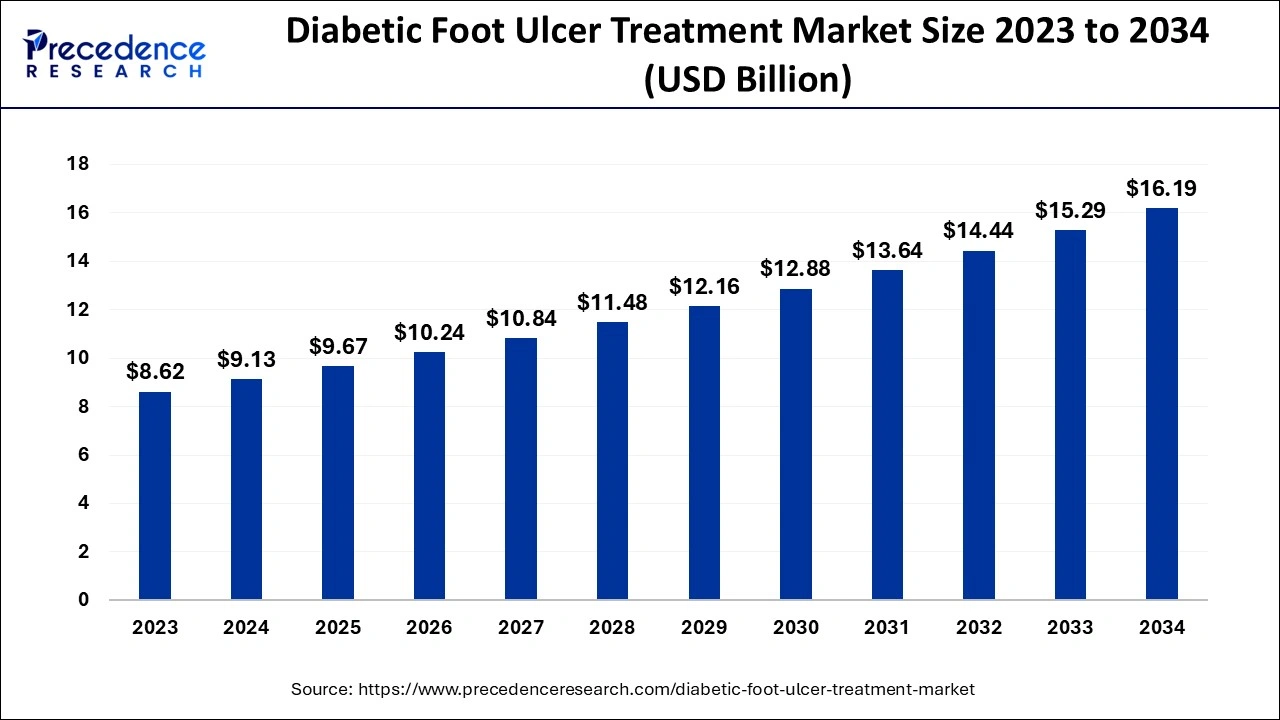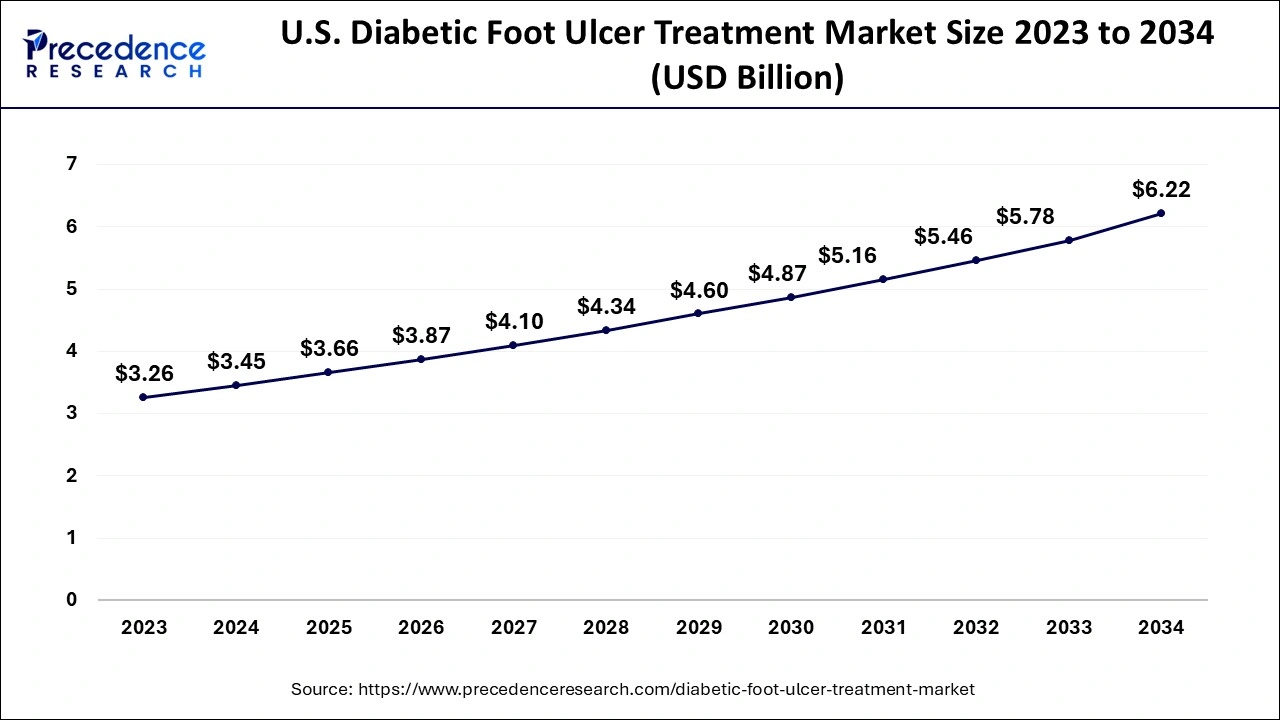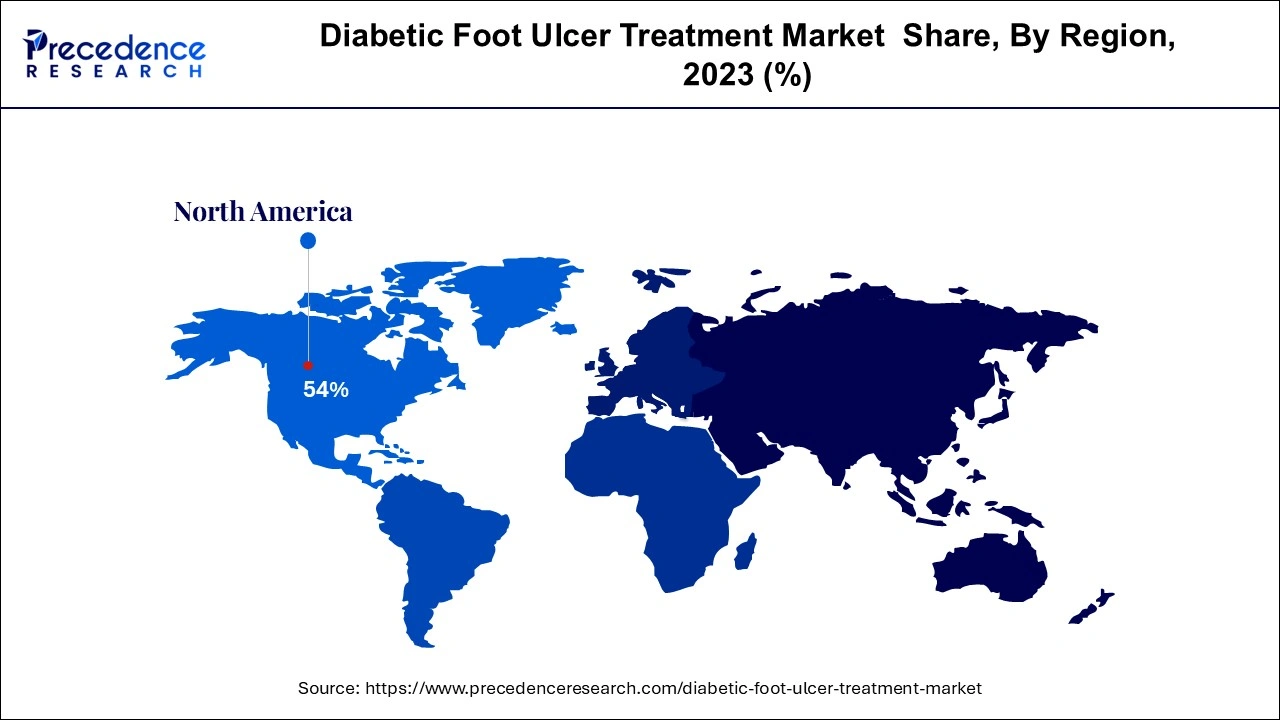January 2025
The global diabetic foot ulcer treatment market size accounted for USD 9.13 billion in 2024, grew to USD 9.67 billion in 2025 and is predicted to surpass around USD 16.19 billion by 2034, representing a healthy CAGR of 5.90% between 2024 and 2034. The North America diabetic foot ulcer treatment market size is calculated at USD 4.93 billion in 2024 and is expected to grow at a fastest CAGR of 5.99% during the forecast year.
The global diabetic foot ulcer treatment market size is estimated at USD 9.13 billion in 2024 and is anticipated to reach around USD 16.19 billion by 2034, expanding at a CAGR of 5.90% from 2024 to 2034.

The U.S. diabetic foot ulcer treatment market size is evaluated at USD 3.45 billion in 2024 and is predicted to be worth around USD 6.22 billion by 2034, rising at a CAGR of 6.05% from 2024 to 2034.

The North American market has dominated the segment due to the presence of the huge geriatric population in this region. Diabetes is the most common disease in this age group which often leads to diabetic foot ulcers. The sedentary lifestyle practices followed by the people have increased the number of cases of diabetic foot ulcer. Every second person in this region supports with diabetes which helps to boost the market for diabetic foot ulcer treatment.

The Asia Pacific region forms the next sector which dominates the segment as a result of the use number of questions belonging to this region. The rapid urbanization seen in this region has led to sedentary lifestyle and faulty food habits which leads to diabetes and it's complications. The European market has too made a significant contribution to the growth of the market.
The rapid modernization and urbanization has boosted lifestyle practices of the people which have given rise to a number of chronic diseases. Among the many others the most common chronic disease which has been observed among the people is diabetes. There are multiple complications which diabetic individual has to face as a result of the lack of old healing power of the body which leads to easy creation of sepsis and infection.
Diabetic foot ulcer is one of the major complications which is faced by a diabetic person as the wound healing power of the body is it reduced tremendously. It is the formation of a wound usually in the foot of the patient which undergoes rapid decomposition and leads to the production of infectious microorganisms in that particular area. The diabetic patients usually rely on certain common medications which they have to take on a regular basis in order to maintain their sugar levels. One of them is the injection of insulin into the body externally. These patients usually have higher and say of having a diabetic foot ulcer as a result of the minute injuries that take place during the process of injection.
The increasing sedentary lifestyle practices have increased the number of people suffering with obesity. This becomes another causative factor for people suffering with diabetes and other chronic diseases. It also proves to be a complication which leads to diabetic foot ulcers as the heavy weight of the body is forced upon the foot leading to multiple injuries.
The occurrence of pandemic had a considerable impact on the market of the diabetic foot ulcer treatment. Respect government rules and regulations regarding restricted movement had hampered the patient flow of diabetic foot ulcer to the hospitals and health care center. The constant clock down so I am for the movement of the patients which restricted the scope of treatment provided by the health care centers. The demand and supply chain of the medical equipments and medicines between the manufacturer and the hospitals concerning the diabetic foot ulcer treatment was disrupted which hampered the growth of the market tremendously.
The disposable income of the people infected during the pandemic was exhausted in treating covid which did not leave any scope for diabetic foot ulcer treatment. The high costs associated with the medicines which are used for treating diabetic foot ulcer were not supplied in the adequate quantities which imposed and additional pressure on the market by increasing their cost further. Moreover, diabetes became another complication during the pandemic which exhausted the supplies of the medicines required for managing diabetes. This complication further led to new established cases of diabetes. The supply and demand of insulin was also hampered during the course of the pandemic. These multiple reasons during the covid crisis hampered the diabetic foot ulcer treatment market to a great extent.
A high prevalence of diabetes among the people all over the world has increased the risk of related complications very common in the society. Among the many other complications, the most major complication of all is the development of a diabetic foot ulcer. This is the creation of a complex wound in the foot region of the lower limbs of the individual which is very difficult to heal due to its lack of capacity to heal itself. On the other hand, management of such a wound becomes very difficult pertaining to the complexities involved in cleaning of such wounds and washing them with the required solutions. High skilled workforce is required in order to bring about a successful healing process of such a complicated wound. A number of different types of advanced medicines have to be employed in order to bring about a successful healing process and to prevent further sepsis. These medicines are highly costly and are not very easily available in the market due to their rare demands as a result of their high cost. Lack of physical activity among the youngsters as a result of their busy lifestyles and sedentary working habits have increased the risk of obesity and it's related disorders. One of the major disorder caused due to obesity is diabetes which is a cause of many other complications in the human body.
Management of a diabetic foot ulcer requires properly trained individuals with knowledge of anatomy and infection management. These factors are supporting the growth of the market actively and helping the medicine manufacturers to reap good returns from the market. The hospitals providing advanced facilities to the diabetic patients are seeing a growing demand for the management of diabetes and diabetic foot ulcer. The occurrence of the pandemic has helped the market negatively as well as positively. With the strict lockdowns and restricted movement the inflow of the patients to the healthcare center was reduced which hampered the treatment of the diabetic foot patients. It had slowed down the demand and supply of the medicines required for treatment.
On the other hand, complication of covid which was diabetes help to create a new market for the diabetic foot ulcer treatment. New cases and patients were developed over suffering with diabetes. This will prove to be a great opportunity for the growth of the diabetic foot ulcer market during the forecast period. The rapid organisation of the world has given rise to faulty food habits which in turn gives rise to numerous chronic diseases.
Diabetes being the most common among them proves to be a great opportunity for the growth of the market. The use genetic population presiding in the developed nations proves to be a great market for the diabetic foot ulcer treatment. Since this disease is such that it cannot be managed by the patient themselves, the role of the health care centre becomes very important. Hence the use of proper quality of medical equipments and medicines comes into play, which helps the market to show a significant growth during the forecast period.
| Report Coverage | Details |
| Market Size in 2024 | USD 9.13 Billion |
| Market Size by 2034 | USD 16.19 Billion |
| Growth Rate from 2024 to 2034 | CAGR of 5.90% |
| Base Year | 2023 |
| Forecast Period | 2024 to 2034 |
| Segments Covered | Type, Ulcer Type, Grade, Treatment Type, End User, Geography |
Advanced wound care has dominated the segment as a result of the modern techniques and medicines that are put into use by the medical fraternity in order to obtain better results and fast healing of wounds. The the advanced methods though are costly help to provide a successful treatment and healing process for the patients. It also helps the medical fraternity to have a better judgement regarding the condition of the patients.
The dressing of the patients is a very essential part of treatment, hence it forms the next important sector of the segment. This segment is expected to show the fastest growth during the forecast period. Modern medicines are being used in performing the dressing of the patients which helps the wound to heal faster. Biologics forms the next segment under this heading which is showing a considerable growth.
Neuropathic ulcers are the most common type of ulcers that the patients are seen with. Hence this segment dominated the market under this category. This type is the most difficult to manage as it produces immense pain and discomfort to the individual hence the use of medicines also increases which helps to boost the revenue return for the diabetic foot ulcer treatment market.
The ischemic type of ulcers forms the next segment which is found among the patients with a more serious type of pathological change. The tissue of the part degrades heavily and needs to be surgically removed in order to heal the wound which provides the market a great opportunity to show the efficiency and efficacy of its medicines. The combination of both these types forms the last type under this heading.
Hospitals becomes the primary place where a patient first approaches under such circumstances which makes it the largest market under this segment. The management of such big and complex ulcers takes place only in a hospital setup where all the other facilities are available. A well trained medical staff is required in order to manage a diabetic foot ulcer properly and facilitate healing. This is available only in a hospital setup where other multiple services are provided with the availability of a qualified doctor too. Home care becomes the next largest market under this segment as a number of patients prefer being treated in their own comfort zone. This market caught pace during the pandemic when patients were not attended by the hospitals to avoid the risk of cross infection. People arranged for their treatment and managed under their own comfort zone which boosted the market. Ambulatory surgery units are the last type under this segment where management of such cases takes place.
By Type
By Ulcer Type
By Grade
By Treatment Type
By End User
By Geography
For inquiries regarding discounts, bulk purchases, or customization requests, please contact us at sales@precedenceresearch.com
No cookie-cutter, only authentic analysis – take the 1st step to become a Precedence Research client
January 2025
March 2025
February 2025
January 2025